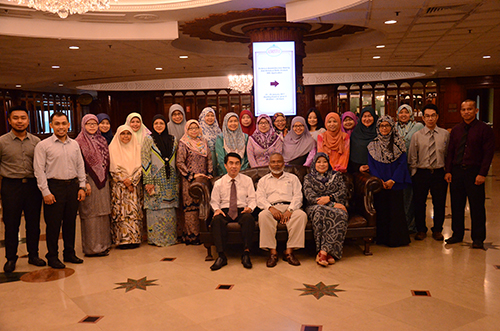Government of Brunei Sponsors Workshop on Evidence-Based Decision Making, Meta-Analysis
Shahjahan Khan, University of Southern Queensland

Workshop participants included (from left) Hj Ashri bin Haji Ahmad, Shahjahan Khan, and Habibah Binti Haji Sion.
The Department of Planning, Development, and Research (DPDR) of the Ministry of Education in Brunei Darussalam organized a workshop on evidence-based decision making and meta-analysis with applications January 23–25, 2017, at the Rizqun International Hotel in Bandar Sri Begawan, Brunei.
Shahjahan Khan, professor of statistics at the University of Southern Queensland, Toowoomba, Australia, and chief editor of the Journal of Applied Probability and Statistics (JAPS), presented the workshop.
DPDR’s assistant director, Hj Ashri bin Haji Ahmad, welcomed the participants, many who were from different departments of the Ministry of Education.
The first day was devoted to presentations about introductory statistics using SPSS and the essential statistical methods for understanding meta-analysis of summary statistics from different independent trials/studies to provide necessary statistical background to participants. The workshop emphasized the importance of being evidence-informed for the decision makers, especially the essence of the levels and quality of evidence including the design of studies. The systematic reviews, as opposed to narrative reviews, must avoid every kind of bias to make the systematic reviews and meta-analyses objective and reproducible.
In addition to introducing various types of effect measure of common effect size for different types of outcome variables, the workshop covered statistical models such as fixed and random effects models. Then, the presenter introduced a recently published method, the inverse variance heterogeneity (IVhet) model, and focused on the major problems with the random effects model in the way of comparing the two models to deal with heterogeneous meta-analyses.
MetaXL software was also used to compare the results of the meta-analyses of the same data set using the fixed, random effects, and IVhet models with particular emphasis on the variation in the redistribution of inverse variance weights under different models, in addition to any variation in the final results.
Because of the background and experience of the participants, and in view of the need of the Ministry of Education, several illustrations on meta-analysis of independent educational studies were included in the presentation and hands-on practice was undertaken. A complete set of notes, example data sets, and presentation slides were provided to all participants prior to the workshop.

















